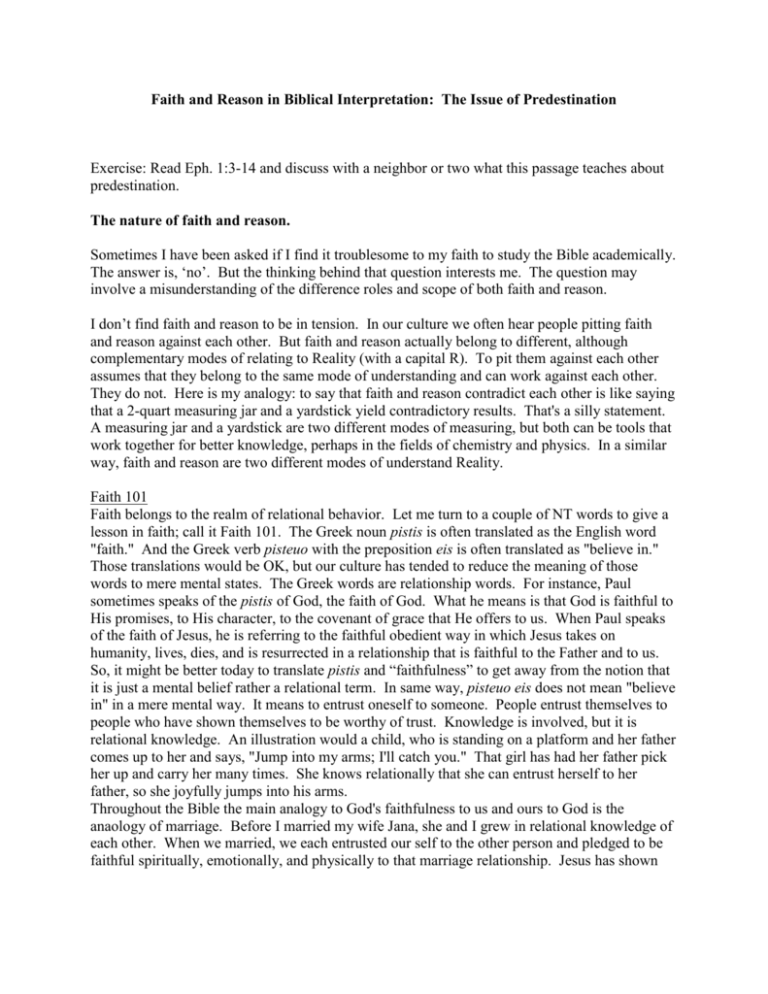written script
advertisement

Faith and Reason in Biblical Interpretation: The Issue of Predestination Exercise: Read Eph. 1:3-14 and discuss with a neighbor or two what this passage teaches about predestination. The nature of faith and reason. Sometimes I have been asked if I find it troublesome to my faith to study the Bible academically. The answer is, ‘no’. But the thinking behind that question interests me. The question may involve a misunderstanding of the difference roles and scope of both faith and reason. I don’t find faith and reason to be in tension. In our culture we often hear people pitting faith and reason against each other. But faith and reason actually belong to different, although complementary modes of relating to Reality (with a capital R). To pit them against each other assumes that they belong to the same mode of understanding and can work against each other. They do not. Here is my analogy: to say that faith and reason contradict each other is like saying that a 2-quart measuring jar and a yardstick yield contradictory results. That's a silly statement. A measuring jar and a yardstick are two different modes of measuring, but both can be tools that work together for better knowledge, perhaps in the fields of chemistry and physics. In a similar way, faith and reason are two different modes of understand Reality. Faith 101 Faith belongs to the realm of relational behavior. Let me turn to a couple of NT words to give a lesson in faith; call it Faith 101. The Greek noun pistis is often translated as the English word "faith." And the Greek verb pisteuo with the preposition eis is often translated as "believe in." Those translations would be OK, but our culture has tended to reduce the meaning of those words to mere mental states. The Greek words are relationship words. For instance, Paul sometimes speaks of the pistis of God, the faith of God. What he means is that God is faithful to His promises, to His character, to the covenant of grace that He offers to us. When Paul speaks of the faith of Jesus, he is referring to the faithful obedient way in which Jesus takes on humanity, lives, dies, and is resurrected in a relationship that is faithful to the Father and to us. So, it might be better today to translate pistis and “faithfulness” to get away from the notion that it is just a mental belief rather a relational term. In same way, pisteuo eis does not mean "believe in" in a mere mental way. It means to entrust oneself to someone. People entrust themselves to people who have shown themselves to be worthy of trust. Knowledge is involved, but it is relational knowledge. An illustration would a child, who is standing on a platform and her father comes up to her and says, "Jump into my arms; I'll catch you." That girl has had her father pick her up and carry her many times. She knows relationally that she can entrust herself to her father, so she joyfully jumps into his arms. Throughout the Bible the main analogy to God's faithfulness to us and ours to God is the anaology of marriage. Before I married my wife Jana, she and I grew in relational knowledge of each other. When we married, we each entrusted our self to the other person and pledged to be faithful spiritually, emotionally, and physically to that marriage relationship. Jesus has shown Himself worthy of our trust. He will be faithful to us. Our role then is pisteuo eis, to “believe in,’ or better, “to entrust our self to” Jesus. Reason 101 Reasoning may well be used in relational knowledge, but it is a different mode of understanding Reality. In the West, philosophy basically came to limit knowledge, meaningful statements, or what we call ‘truth’ to two kinds of reasoning, deductive reasoning and inductive reasoning. Deductive reasoning works like this. Premise one is that all unmarried men are bachelors. Premise two is that Tom is an unmarried man. The conclusion is that Tom is a bachelor. That logical syllogism, or argument, is valid, so it expresses a truth. Inductive reasoning is based on repeated observation and can only arrive at a probability of truth. [Give bear illustration.] I can never know that all bears are dangerous, but I can reach a probability of truth that in general bears are dangerous. And, in our culture, it has often been said that only inductive reasoning that is scientifically measurable may be spoken of as probably true. I want to add a quick side note about “truth.” In our culture, the concept of truth then has often been limited to the results of these two kinds of reasoning, the mode of understanding Reality by reason. But, if we go back to good biblical theology, the concept of truth belongs to the mode of relational knowledge, the mode to which faith belongs. What is ‘true’ in the vocabulary of OT Hebrew is that which is experienced as firm, steadfast, reliable, foundational. One Hebrew word, you already know, the word ‘amen.’ Amen at the end of a prayer does not mean ‘the end’. It means that the prayer or statement was well founded. It is used correctly in a sermon, when someone shouts out ‘Amen’ in agreement to something that is said. The answer to the age old question, ‘What is truth’, in biblical terms is that which is known to be relationally foundational and steadfast, God. The Mistakes of Forcing Philosophical Reasoning on the Bible We tend to forget that one of our main modes of understanding life and Reality is relational. We tend to “buy in” to the limited mode of philosophical reasoning. Such reasoning can be applied to the Bible, but it can also be misapplied. I would like to give you a couple of brief illustrations and then a more developed on. I am one of the faculty advisors to the ASU student apologetics club called, Defense for Faith. The role of apologetics is to be able to give reasonable responses about our Christian faith. God is not illogical and entrusting oneself to Jesus is not illogical. Still, I would be the first to say that limited to the philosophical mode of reasoning, we cannot prove God deductively or inductively. Much of the Bible records God acting historically in time and space. If we accept the general cultural limitation of inductive knowledge to scientifically demonstrable statements, then we cannot prove such events as the Resurrection. Yet, I find some people making such claims. But, to do so, is like playing a game by the wrong rules. The main point that I want to illustrate is where we go wrong with deductive reasoning. Illustration of Inspiration I want to use the doctrine of biblical inspiration as an example, because this is often the main area in which Christians feel threatened by an academic study of the Bible. It is easy for us to start with the premise that the Bible is inspired. I don’t have an argument against that, but I want to come back to that premise in a moment. Unwittingly, however, we then often add other premises that are based on our knowledge of our culture and how writings are composed and how they are authenticated. We come up with the following syllogism: Premise 1: The Bible is inspired Premise 2: (Our limited cultural knowledge of authentic composition.) Conclusion: Therefore, the Bible must have been [ blank ]. The blank is filled in with all kinds of conclusions, perhaps: To be inspired all of the Pentateuch must have been written by Moses; or, if the name of a prophetic book is Isaiah, then a prophet named Isaiah must have written it all. Etc. The problem is that we often do not even see that we are forcing our expectations on the Bible. Let’s go back to the first premise and think about the NT. How did the NT become authoritative? It is true that people were concerned about being able to associate a book or letter with a known person. And, it is true that in the last stage church councils ultimately decided what books were in or out. But in between, there was an experiential stage, a relational stage. These documents circulated. And, in each place where they circulated, people seemed to have settled on the same basic collection of the four gospels, the 13 letters of Paul, and a few others, because these Christian communities experienced these texts as authoritative in their lives, upholding the rule of faith. That is to say, that although there were some reasonable criteria, the main conclusion that these writings were inspired by God, came from relational knowledge. [Illustration of me first reading the NT after my conversion.] One way to summarize this illustration is this. The doctrine of biblical inspiration came from the top down, God breathing life through His Word as people heard/read it. That is, it came from experiential, relational knowledge of these texts that was the common experience of Christian communities. We have to be careful of imposing a bottom-up kind of thinking in which we start with a doctrine of inspiration and impose our own expectations about composition on these texts, and then assume we had better find what we expected. Academically, I am fine with exploring the clues to how these texts might have been formed, how they might have come from oral transmission, and how the communities of believers through several generations may have shaped them over time. Whatever I find will not threaten my relational knowledge that God has still somehow inspired the Bible to convict me of sin, encourage me, strengthen me, and draw me close to Him. Illustration of Predestination I want to give another illustration of how we sometimes imposed deductive thinking, or bottomup thinking on the Bible. In our culture, particularly the Southern Bible Belt, we have been exposed to the Calvinistic doctrine of predestination. This thinking starts with the fact that the Bible uses the language of sovereignty and kingship as an attribute of God. This becomes the starting premise, the bottom-up definition. If God is sovereignly in control of all matters, then it logically follows that people are either chosen to be saved or damned according to God’s will, that such salvation is irresistible, and that those who are called to be saved will persist in their faith and never fall away. In other words, a logically tight deductive argument is systematically developed from the foundational premise that God is sovereign. Here is where the problem lies. An abstract definition of the sovereignty of God does not capture what the concept meant experientially in the ancient world. All language about God is metaphorical. We can only talk about the divine, the ‘other’ world in terms of this world that we know. When the biblical authors used the language of kingship and sovereignty, they were not thinking of some abstract, absolute definition of sovereignty. They were thinking of the roles kings played in their culture. When they thought of a king as being sovereign over his domain, they did not think that the king was responsible FOR everything that happened in his kingdom, as if he somehow willed everything that happened. They thought of kings as being responsible TO what happened in their kingdom. If people in the king’s domain committed injustice, the king was not responsible FOR that injustice, but the king was responsible TO it. He was responsible to bring about justice and to establish a peaceful rule. When they spoke of God as King, as ruling, as sovereign, they were starting with a relational concept and applying it by analogy to God. They were not forming a logical syllogism/argument with an abstract concept of sovereignty as the starting premise. Now, let’s come back to Ephesians Chapt. 1:3-14, which you read at the beginning. In these verses we come across the terminology of predestination to which we have been exposed. Having heard the Calvinistic definitions associated with these terms, it is very difficult for us to look at the passage freshly and see what Paul is saying. If we read this letter closely, we will realize that Paul is teaching one of the main concepts that forms the backdrop for most of his letters: He wants his mainly non-Jewish audience, that is Gentiles, to know that even though God brought salvation first through the Jews, that in Jesus, God has included them/Gentiles in the promises to Abraham, offered salvation to all people, and has united Jewish believers and Gentile believers into one body in Christ Jesus. He explains his role to bring the Gospel to the Gentiles in an excursus found in Chapt. 3. If we read closely, we will notice that Paul makes a major shift from talking in first person plural (‘we’) to second person plural (‘you’) at verse 13. When we modern Christians read ourselves in to the ‘we’ passages, we miss what Paul was saying to his original audience. We want to read ourselves into the ‘we’ passages. But when Paul says ‘we’ in the first part of Ephesians, he is talking about the collective calling of Jews/ Israel to fulfill the promises to Abraham. Israel was called and predestined for God’s salvific purposes for the nations/Gentiles. And, when Paul shift to ‘you’ (verse 13), he is now talking to the non-Jewish Gentiles and letting them know that they are now included in Christ. [Read relevant verses.] Moreover, if we look closely about how Paul is using the language of predestination, it is not in the Calvinistic sense. He is not saying that (1) individuals are (2) inescapably predetermined by God (3) to be saved. He uses this language to say that the people of Israel were called collectively, corporately, to be used for the redemptive purposes of God. That is: the calling is (1) collective, not individual; it is not irresistible, not all will respond; and, it is (3) for God’s purposes, not the salvation of a person. [Illustration of Isaiah responding voluntarily to God’s ‘call’ in Isa 6.] Summary Faith and reason are not opposites, but work together. Faith belongs to relational understanding and behavior. o [Reason is useful, but reductionistic of Reality.] o [Care should be used when trying to prove God or faith by the tools of reason.] Care should be used not to force doctrines deductively on the Bible. Definitions of terms (sovereignty) should arise from the biblical contexts, not philosophical abstractions. Care should be used to read the Bible in context.









